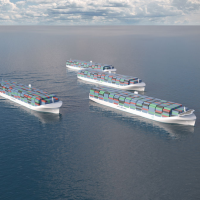Rolls-Royce of Drones May Be Unmanned Cargo Ships

Rolls-Royce motor cars have a long history as England’s ultimate luxury vehicle, even popping up from time to time in the enormously popular British TV series Downton Abbey. In earlier episodes, one of Lady Edith’s few suitors, Sir Anthony Strallan, even took her for a few spins in his new Rolls-Royce before eventually abandoning her at the altar.
We do tend to associate a Rolls with the likes of James Bond, Lord Grantham, or even the Patriot’s quarterback Tom Brady. Most of us don’t think of this venerable British brand in terms of high-tech connected vehicles. Well, that just might change in the future.
Is Rolls-Royce entering the driverless automobile market with a connected Phantom? Not that we know of. However, as Rolls-Royce Holdings, the company is a well-known provider, designer, and manufacturer of power systems for air, sea, and land applications. These days, Rolls-Royce is in the early stages of exploring an interesting transportation technology concept for the maritime market: unmanned cargo freighters or drone ships.
The Rolls-Royce Marine Engineering and Technology division’s Blue Ocean development team spearheads maritime technology, ship design, and machinery concepts. Bloomberg News reports the company began developing designs for unmanned freighters last year and has created a virtual reality prototype at its Norway offices.
Bloomberg News quotes Oskar Levander, Rolls-Royce’s vice president of innovation in marine engineering and technology, as saying that the drone ships could possibly be deployed in regions such as the Baltic Sea within the next ten years. The article further states:
The company’s schematics show vessels loaded with containers from front to back, without the bridge structure where the crew lives. By replacing the bridge -- along with the other systems that support the crew, such as electricity, air conditioning, water and sewage -- with more cargo, ships can cut costs and boost revenue, Levander said. The ships would be 5 percent lighter before loading cargo and would burn 12 percent to 15 percent less fuel.
The company predicts container ships and dry-bulk carriers will be the first to transition to unmanned ships as technology for navigation via computers develops.
Is there a need for unmanned cargo vessels in the global shipping industry that Rolls-Royce estimates at $375 billion annually? Will these so-called drones actually be a safer, cheaper, and possibly more environmentally-friendly transportation alternative? It’s a concept some feel worth exploring.
The Maritime Unmanned Navigation through Intelligence in Networks (MUNIN) is a collaborative research project co-funded by the European Commission to develop the concept of an “autonomous ship,” controlled by a remote operator in a shore side control station, to help determine viability of the concept.
However, as with drone delivery by air, there are many hurdles to overcome, from government regulations to unions, to name a couple. In other words, it undoubtedly will be some time before Rolls-Royce is awarded the designation “Rather Splendid Drone Ship of the Year”.

